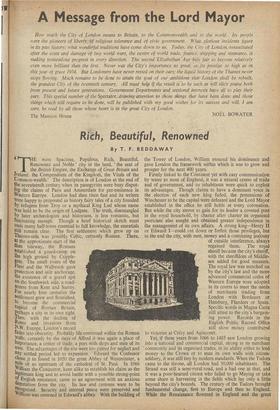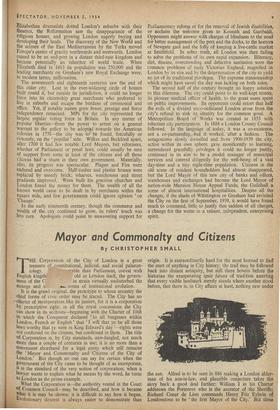Rich, Beautiful, Renowned
By T. F. REDDAWAY HE :lost Spacious, Populous, Rich, Beautiful, Renowned and Noble' city in the land, the seat of fades into obscurity. Probably life continued within the Roman certainly by the days of Alfred it was again a place of Importance, a centre of trade, a port with ships and men of its OW11. The advantages of the site were too patent for neglect and any settled period led to expansion. Edward the Confessor chose,it to found in 1050 the great Abbey of Westminster, a llile so upstream of the cathedral of St. Paul. In 1066 ,William the Conqueror, keen alike to establish his claim as the legitimate king and to avoid battle with a possible strong-point ,of English resistance, came to an agreement with an anxious uePutation from the city. Its law and customs were to be Lecognised. Security and internal peace were preservod and william was crowned in Edward's abbey. With the building of the Tower of London, William ensured his dominance and gave London the framework within which it was to grow and prosper for the next 400 years.
Yet, if these years from 1066 to 1485 saw London growing /into a national and commercial capital. strong in its merchant community and its organised trades, in its ability either to lend money to the Crown or to man its own walls with citizen• soldiery, it was still tiny by modern standards. When the Tudors came to the throne, all London had 50,000 inhabitants. The Strand was still a semi-rural road, and a bad one at that, and it was a poor-hearted citizen who failed to go Maying or take some share in harvesting in the fields which lay only a little beyond the city's bounds. The century of the Tudors brought fundamental change, first to Europe and then to England. While the Renaissance flowered in England and the great Elizabethan dramatists dotted London's suburbs with their theatres, the Reformation saw the disappearance of the religious houses, and growing London eagerly buying and developing their lands. The discovery of the New World and the seizure of the East Mediterranean by the Turks moved Europe's centre of gravity northwards and westwards. London ceased to be an end-port in a distant third-rate kingdom and became potentially an inheritor of world trade. When Elizabeth died in 1603 its population was 250,000 and the leading merchants on Gresham's new Royal Exchange were, in modern terms, millionaires.
The seventeenth and eighteenth centuries saw the end of this older city. Lost in the ever-widening circle of houses built round it, but outside its jurisdiction, it could no longer force into its citizenship great merchants who preferred to live in suburbs and escape the burdens of ceremonial and office. Yet, if notable names grew fewer, prestige and fierce independence remained. MPs for the city represented the largest regular voting force in Britain. In any matter of popular liberties—from the power to arrest on a general Warrant to the policy to be adopted towards the American colonies in 1776—the city was to be found, forcefully or riotously, on the 'popular' side. Wilkes and Beckford apart, after 1700 it had few notable,Lord Mayors, but reformers, Whether of Parliament or penal laws, could usually be sure of support from some at least of the citizens and all those citizens had a share in their own government. Materially, also, its progress was spectacular. Plague and Fire were endured and overcome. Half-timber and plaster houses were replaced by seemly brick; wharves, warehouses and street gradients improved. Wren built his gracious churches and London found the money for them. The wealth of all the known world came to be dealt in by merchants within the Square mile, and few governments could ignore opinion 'on 'Change.'
In the early nineteenth century, though the commerce and Wealth of the city continued to grow, its rulers' touch was less sure. Apologists could point to unwavering support for Parliamentary reform or for the removal of Jewish disabilities, or acclaim the welcome given to Kossuth and Garibaldi. Opponents might answer with charges of blindness to the need. for better management of the port and the docks, to the horrors of Newgate gaol and the folly of keeping a live-cattle market at Smithfield. In sober truth, all London was then failing to solve the problems of its own rapid expansion. Illiteracy, dirt, disease, overcrowding and defective sanitation were the common problems of early Victorian England, magnified in London by its size and by the determination of the city to yield no jot of its traditional privileges. The supreme statesmanship which might have saved the day was lacking on both sides.
The second half of the century brought no happy solution to this dilemma. The city could point to its well-kept streets, its pioneer medical officer of health, to the great sums spent on public improvements. Its opponents could retort that half the evils of a divided unco-ordinated London arose from the city's refusal to sink its, identity for the common good. A Metropolitan Board of Works was created in 1855 with reluctant city participation. In 1888 a London County Council followed. In the language of today, it was a co-existence, not a co-partnership, but it worked, after a fashion. The antagonisms slowly dwindled and from 1900-1939 the city, active within its own sphere, gave munificently to learning, surrendered gracefully privileges it could no longer justify, continued in its aim to be a ,model manager of municipal services and catered diligently for the well-being of a vast day-time and a tiny night-time population. Citizens in the old sense of resident householders had almost disappeared, but the Lord Mayor of this new city of banks and offices, Warehouses and exchanges had become the Lord Mayor of nation-wide Mansion House Appeal Funds, the Guildhall a scene of almost international hospitalities. Despite all the changes, if the shade of Whittington or Gresham had revisited the City on the first of September. 1939, it would have found much to commend, little to justify that saddest of all charges, a change for the worse in a valiant, independent, enterprising spirit.



































































 Previous page
Previous page